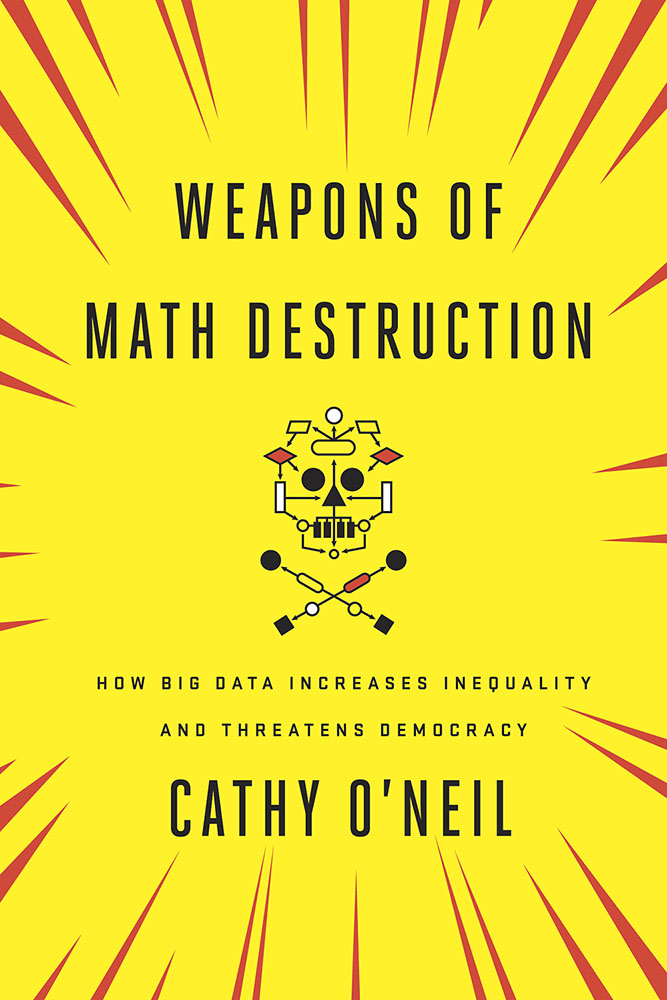Weapons of Math Destruction: In the Archives
In Cathy O’Neil’s book Weapons of Math Destruction, the author presents arguments for how algorithms increasingly control critical functions in our lives and the danger of increasing our dependence on these flawed algorithms. Due to the inability of algorithms to interpret the complexity of humans and our lives and due to the inherent and implicit bias present in the creators of these algorithms, we see systems perpetuating and deepening inequities. O’Neil notes that algorithms represent the values and assumptions of their creators and that creators of algorithms tend to come from groups who hold a lot of power, namely white-cis- hetero-males.
While much of the material in Special Collections and University Archives cannot speak to the issues with present day algorithms, what these collections can help us understand are the “historical data sets” that drive our cultural implicit biases and shape the algorithms we encounter everyday. These items allow us to explore the ways that bias has historically played a role in upholding inequitable systems. By better understanding lessons of our past, we can resist succumbing to the same missteps as our predecessors. Explore material from our collection related to higher education, hiring and employment, credit, insurance, and advertising.
The Truth About Algorithms | Cathy O'Neil
Higher Education
Correspondence About G.I. Bill
Louisiana, 1971
Spiro T. Agnew Papers
The 1944 G.I. Bill provided a wide range of benefits for returning World War II veterans, including payments for the cost of living expenses and tuition for high school or college. Other benefits included low-interest loans for starting a farm or business, low-cost mortgages, and one year of unemployment compensation. These social programs were extremely helpful to millions of veterans across the country but left Black WWII veterans wanting; the G.I. Bill accommodated Jim Crow laws and therefore allowed discrimination from state and local governments. Because of the unbalanced benefits for white and Black veterans, historian Ira Katznelson described the G.I. Bill as affirmative action for whites.
Higher Education
Affirmative Action Programs
No Date
AFL-CIO Information Department Records
Affirmative Action has been important to maintaining diversity, especially in higher education. Historically, when the government has repealed measures that aim to guarantee diversity because they no longer seemed necessary, equality has measurably decreased.
Advertising
Cosmopolitan Magazine
March 1971
Literary First Appearances Collection
Advertisements have long-targeted marginalized members of society like Black people and women. Tobacco advertisements have some particularly egregious examples.
These images, targeted to women, manipulate the fear of gaining weight and encourage women to smoke to remain slim. These images, targeted to men, objectify women and display them as sex objects. In the early twentieth century, pin-up girls would have been prominently featured in tobacco ads; in more recent years, the use of cleavage and direct eye contact sexualizes the model. Though such ads are meant to appeal to young men, the objectification of women in ads hurts women, too, as it leads many young women to believe that they need to fit a certain mold to be desirable.
Hiring
Sample Checklist on Discrimination
No Date
AFL-CIO Information Department Records
Hiring
“I Can Run Your Machines!” Booklet
c. 1940s
AFL-CIO Records, William Green Papers
Hiring discrimination can often arise when employers use assumptions about applicants instead of really assessing the individual on their own merits. This pamphlet challenges commonly held beliefs about unemployed Black laborers.
Hiring
National Urban League Correspondence
Washington, D.C., 1941
AFL-CIO Records, William Green Papers
Employment
Garment Workers’ Employment Discrimination
Atlanta, Georgia, 1970s
AFL-CIO Civil Rights Department Files
This group of material includes the correspondence and charges of race-based discrimination against the Empire Manufacturing Company and the United Garment Workers of American union.
Credit
Women, Credit and Housing WRTCV Editorial
Washington, D.C., 1973
Pauline Menes Papers
Credit
Credit for Women WTOP Editorial
Washington, D.C., 1972
Pauline Menes Papers
Credit
“Women Can Apply New Credit Rights”
The Washington Star, 1970s
Pauline Menes Papers
This article advises women to take action after Federal Equal Credit Opportunity Act enables them to establish a credit history through various methods. The authors note that “you, as an individual, may have no credit history and may not legally exist.”
Insurance
Health Insurance Cartoons by John Stampone
1970s
AFL-CIO Information Department Records
Americans have struggled for a long time with the high costs of health insurance. These cartoons note that even, 50 years ago, there was recognition that nationalized health care could ease financial strain for many.

